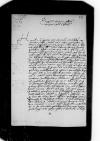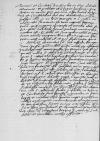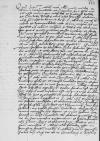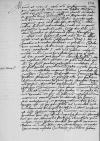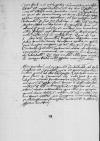Defunctus nuper, rediens ad Serenissimam Maiestatem Vestram, tam diuturno legationis munere, inter multa alia Serenissimae Maiestati Vestrae desiderium illustrissimi domini ⌊Ottonis Henrici comitis palatini Rheni⌋ et ea, quae mihi Serenissimae Maiestati Vestrae referenda multis precibus iniunxit, retuli, quodque his de rebus proprium cum litteris nuntium missurus esset, praedixi, sic enim, cum ⌊Ratisbonae⌋ una essemus, constituerat. Is nuntius ferens litterarum fasciculum obsignatum et mihi inscriptum ex ⌊Cracovia⌋ ad ⌊conventum Graudnicensem⌋ ad me venit, quem hucusque non alia de causa retinui, quam quod ex litteris ad me domini ⌊comitis palatini⌋ intellexeram, quod ipsemet pro ⌊conventu Regni⌋, quem sibi a me describi petierat, conferre se ad Serenissimam Maiestatem Vestram decrevisset, vel fratrem suum mittere, ⌊comitem palatinum Fredericum⌋. Quod cum mihi non videbatur futurum ex re Serenissimae Maiestatis Vestrae et quod iam fortassis ⌊conventus⌋ sit solutus aut fini propinquus, hunc nuntium cum litteris ⌊domini sui⌋ ad Serenissimam Maiestatem Vestram remisi. Moram autem per litteras domino ⌊comiti palatino⌋ excusavi, quod dominus ⌊Nibschicz⌋, ad quem etiam litteras dederat, abesset in legatione Serenissimae Maiestatis Vestrae et quod sine eo nuntius parum efficere potuisset, quodque igitur quousque dominus Nibschicz rediret, nuntium detinuissem. Hunc Serenissima Maiestas Vestra, quaeso, benignis litteris pro relatione a me Serenissimae Maiestati Vestrae facta expediat et a se dimittat, quandoquidem princeps ipse, quantum ego certa assequi potui coniectura, Serenissimae Maiestati Vestrae videtur addictissimus et qui libenter non solum gratificaretur, verum etiam Serenissimae Maiestati Vestrae, ubi posset, inserviret in omnibus. Debitum hoc visus mihi est non tam ex se quam ex aliorum inductione quaerere et hoc propter patruelem suum, ⌊ducem Fredericum⌋, quemadmodum coram latius Serenissimae Maiestati Vestrae exposui etc.
Cum Serenissima Maiestas Vestra ex divina voluntate me indignum et immeritum in hunc statum collocare dignata est, convenit etiam, ut Serenissima Maiestas Vestra me in eo manuteneat et tueatur, his praesertim periculosis temporibus et inter eos ⌊vicinos⌋, quibus saeptus sum, quodque auctoritate sua contra quosdam rebelles meos me fulciat, qui apostatas monachos et damnatae sectae professores publice apud se alunt et fovent, de quibus reverendissimo domino meo ⌊episcopo Cracoviensi⌋ scripsi latius. Supplico igitur humillime Serenissimae Maiestati Vestrae, velit clementer an<n>uere, ut quaedam Serenissimae Maiestatis Vestrae mandata, quibus meos in ordine et officio retinere possim, mihi mitterentur. ⌊Nostra haec Prussia⌋ pestilenti hac lue non parum est infecta. Serenissima Maiestas Vestra quosdam
cf. Cic. Tusc. III 6.13 nos autem audeamus non solum ramos amputare miseriarum, sed omnis radicum fibras evellere ⌊ramos amputavit, illaesa radice,cf. Cic. Tusc. III 6.13 nos autem audeamus non solum ramos amputare miseriarum, sed omnis radicum fibras evellere ⌋ ex qua innumeri alii pullulant. Utinam aliquando istius tragoediae videamus finem. Alia non restant, quam quod me humillime Serenissimae Maiestati Vestrae, domino meo clementissimo, commendo Deumque Omnipotentem precor, ut eandem Serenissimam Maiestatem Vestram nobis et ⌊Sanctae suae Ecclesiae⌋ totique ⌊reipublicae Christianae⌋ quam diutissime sospitem et felicissimam conservet.
Cum Serenissima Maiestas Vestra nullis meis meritis ex divina voluntate et singulari sua gratia me eum esse voluit, qui ⌊consiliis et iudiciis terrarum et civitatum Prussiae⌋ cum aliis praeesse debeam idque summopere curare, ut ⌊rei publicae⌋ Serenissimae Maiestatis Vestrae eiusque commodo et tranquillitati non desim, maxime ad me spectat id omne in notitiam Serenissimae Maiestatis Vestrae deducere, per quod quies publica posset turbari et fortassis novi quidam tumultus excitari, unde fact[u]rus operae pretium et pro fide mea Serenissimae Maiestati Vestrae humi[l]lime supplico, dignetur ea audire clementer leg[i] et in animum admittere, quae sequuntur. Quidam ⌊Hans Holsten⌋ ex ⌊Holsatia⌋ civis Gdanensis, qui malis artibus, ut certo doceri potest, non pauca in ⌊civitate Serenissimae Maiestatis Vestrae Gdanensi⌋ est assecutus et plerisque, quemadmodum talium hominum mos est, cum suo profectu imposuit, nuper contra privilegia, iura et municipales constitutiones ⌊terrarum et civitatum Prussiae⌋ a Serenissima Maiestate Vestra exemptionem obtinuit de stando iuri et parendo legibus constitutionibus et plebiscitis civitatis Gdanensis, quodque a nemine quam a Serenissima Maiestate Vestra aut commissariis Serenissimae Maiestatis Vestrae iudicari debeat et causa indicta partis et cum non constet de vi aut gravamine nullaque intercesserit legitima appellatio, exlex factus est, quod hic apud nos insolens est et prius vix auditum, illeque de hac exemptione et exlegi libertate Gdani cum eorum, qui legibus a Serenissima Maiestate Vestra praefecti sunt, non parvo contemptu et dolore, publice exsultat et quibusdam insultat etiam. Nemo umquam civis fuit ⌊Gdani⌋, cui talis fuisset immunitas vel potius licentia concessa, ut agens et vivens Gdani habensque cum omnibus commercia non deberet quacumque de re in ius vocatus respondere et, quemadmodum alii cives, stare et parere iuri. Statuit etiam, cum novissime Serenissima Maiestas Vestra feliciter esset in ⌊Prussia⌋, certum modum Serenissima Maiestas Vestra in processu iuris nostri et quod ea de re ⌊consiliarii Serenissimae Maiestatis Vestrae terrarum et civitatum Prussiae⌋ bis in anno deberent convenire et publica celebrare iudicia, praesertim in causis, quae per viam appellationis ex terris et civitatibus ad eos devolvuntur. Iste ⌊Holsten⌋ nulla in re hunc processum a Serenissima Maiestate [V]estra ordinatum servavit et tam ingentem praerogativam, quae magnis de causis et meritis dari solet, cum nihil tale homo exoticus meritus sit, nactus est, quod multi non sine admiratione et passione animi conqueruntur. Et ut ingenue fatear, neque mihi ob id et pro fide mea qua Serenissimae Maiestati Vestrae devinctus sum, ab affectu temperare possum, cum videam, quantum mali ex istiusmodi indulgentiis oriri possit. In primis hoc fit, quasi nobis, Serenissimae Maiestatis Vestrae ⌊consiliariis⌋ et illis, quos Serenissima Maiestas Vestra legibus praefecit, non credatur et quod huiusmodi exleges ab omnium iuridica impetitione sint immunes. Si quispiam pauper civis vel nobilis, cui fortassis ipse ⌊Holsten⌋ etiam in parvo, quod pauperi magnum est, solvendo esse reluctatur, semper ad Serenissimam Maiestatem pro commissione et commissariis confugere debeat, cogetur causas suas et debitum ob impensae defectum relinquere. Qua de re conscientia et fide mea ductus, Serenissimae Maiestati Vestrae fidelissime consulo et humillime supplico, dignetur nos, Serenissimae Maiestatis Vestrae fidos subditos, in terris et civitatibus suis ⌊Prussiae⌋ clementer in privilegiis et iuribus nostris, quorum nuper processum nobis ordinavit, manutenere et conservare et hoc fidissimum sinceri animi mei consilium gratia sua boni consulere et deinceps non permittere, ut istiusmodi impostorum technae Serenissimae Maiestatis Vestrae subditis et eorundem iuribus officiant.
Meminit, ut reor, Serenissima Maiestas Vestra ⌊consanguineorum⌋ meorum, qui superioribus annis mari contra ⌊hostes Moschos⌋ Serenissimae Maiestatis Vestrae suis impensis et proprio ⌊Marte⌋ militabant et quaedam bona ⌊Gdanensium⌋, qui cum ⌊Moscovitis⌋ habuerunt commercium, in ipsorum hostium navibus reperta acceperunt, quae etiam illis per sententiam Serenissimae Maiestatis Vestrae ⌊Vilnae⌋ fuerant adiudicata, unde non in parvum ⌊Gdanensium⌋ inciderant odium. Suntque duo fratres, nomi[na] illorum ⌊Iacobus⌋ et ⌊Adrianus Flint⌋. Novissime cu[m] Serenissima Maiestas Vestra ⌊Gdani⌋ fuerat, odium hoc in illos nondum erat extinctum, deferebantur itaque Serenissimae Maiestati Vestrae ⌊Iacobus⌋ ut auctor factionis a plebe in consulatum coactus, ⌊Adrianus⌋ quasi parva sua navi exsistente Serenissima Maiestate Vestra Gdani magnum militum numerum invehere statuisset, quae ei igitur ab his, quorum prius bona in navibus hostium Serenissimae Maiestatis Vestrae ceperat, fuit ablata et cum nihil tale contra illum et fratrem probari potuisset, multatus fuit cum fratre exilio, quod iam tot annis non satis merito pertulerunt manentibus impune Gdani ⌊Conrado de Suchten⌋, ⌊Ioanne Schachtman⌋, ⌊Ioanne Pelken⌋, ⌊pictore Michaele⌋ et plerisque aliis, qui quantumvis dissimulent, virus tamen suum quin spargant, tegere non possunt. Manet et ecclesiastes Thorunensium ⌊Georgius Czymmerman⌋ sine poena, manent et alibi alii et vivunt, qui istius seditionis et pestis fuerunt exordium et qui non solum non resipiscunt, immo acerrimi errorum suorum et damnatae huius haeresis sunt antesignani et propugnatores. Faex plebis passa est et ii, qui plebem ad tumultum exstimulaverant, primipili triumphant. Liberum praeterea est omnibus ⌊Gdanum⌋ ingredi, morari, commercia publice habere, qui ductis lupabus fuerant monachi, vel qui ex monachis facti sunt carnifices, quorum nuper unus Gdani crudele hoc officium exercuit. Nemo non admittitur ex ⌊Monte Regio⌋ et ex aliis ⌊Germaniae⌋ infectis civitatibus, qui libere ⌊Gdani⌋ cives facti vel etiam hospites commorantur et, quam diu libitum est, negotiantur. Soli ii duo ⌊consanguinei⌋ mei cum ecclesia nostra sentientes nedum resipiscentes et quos ipse examinavi et bonos Christianos repperi, perpetuo coguntur exsulare ob hoc potissimum odium contractum, quod suo aere fideliter Serenissimae Maiestati Vestrae contra ⌊Moscovitas⌋ militaverint. Hi profecto cum nihil aliud quam puri idiotae et milites sint maritimi, nullum fecerunt vel facere possunt in musica periculum, multo minus in religione. Qua de re Serenissimae Maiestati Vestrae humillime supplico, dignetur iam satis punitos tanti temporis exilio in gratiam suam rursus recipere et eam illis, quam prius in ⌊civitate Gdanensi⌋ habuerant, dare et clementer concedere morandi et negotia sua exercendi libertatem, quod ego una cum illis pro modulo exiguitatis nostrae perpetuo mereri studebimus.
Misi paulo ante ad exigendam contributionem ab ⌊ecclesiasticis et spiritualibus meis⌋ et parum admodum invenio, quod ab illis haberi possit. ⌊Capitulum meum⌋, in quo sunt 4 canonici, de bonis suis 40 et aliquot marcas Prutenicales contribuerunt. Alii conqueruntur propter istorum temporum difficultatem miseruntque ad me rogantes, ut pro eis ad Serenissimam Maiestatem Vestram intercederem, quo illis hoc exiguum, quod dare debent, Serenissima Maiestas Vestra clementer remitteret, Deum pro longaeva incolumitate et felicissimorum successuum incremento Serenissimae Maiestatis Vestrae perpetuo oraturi.
